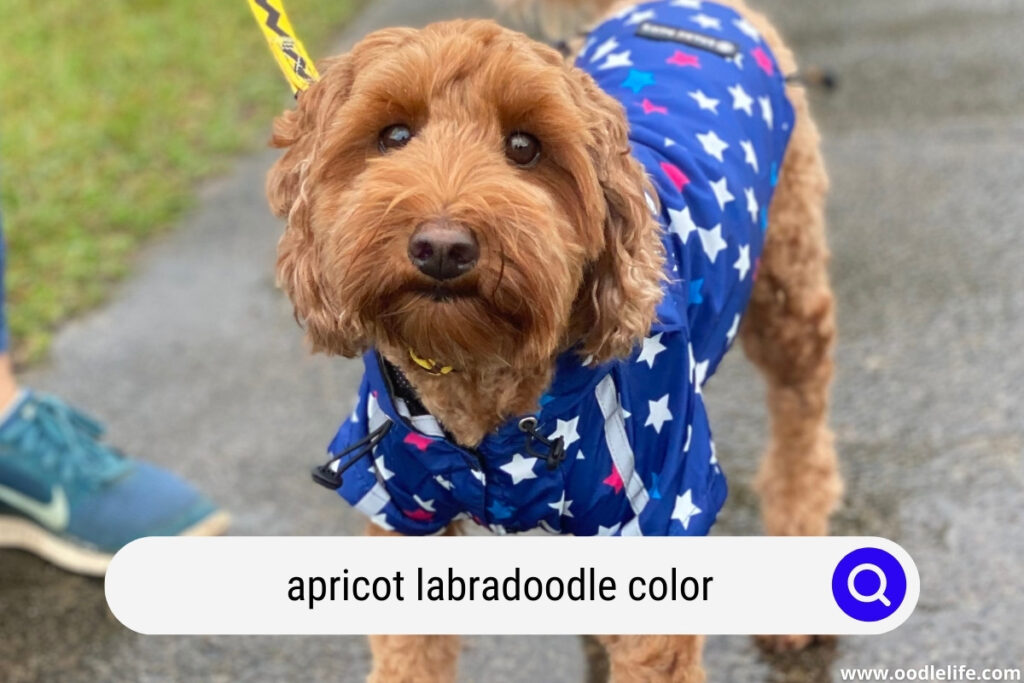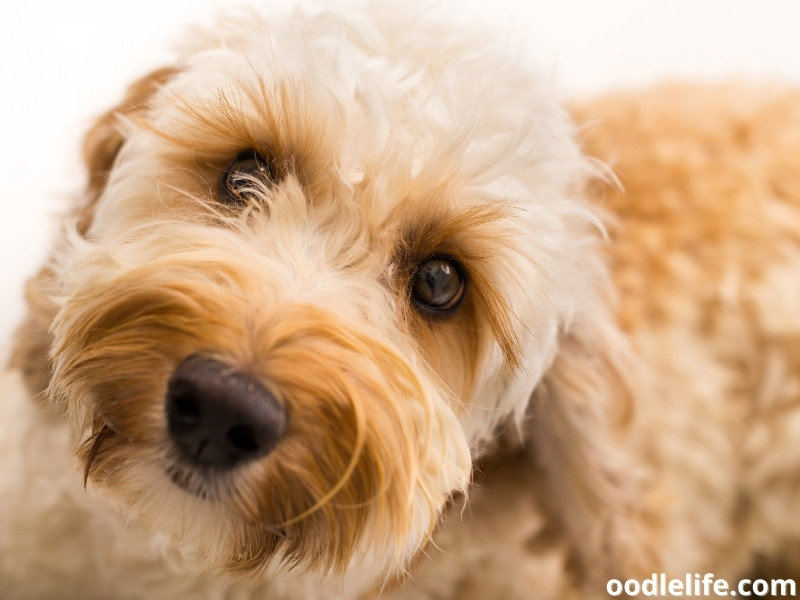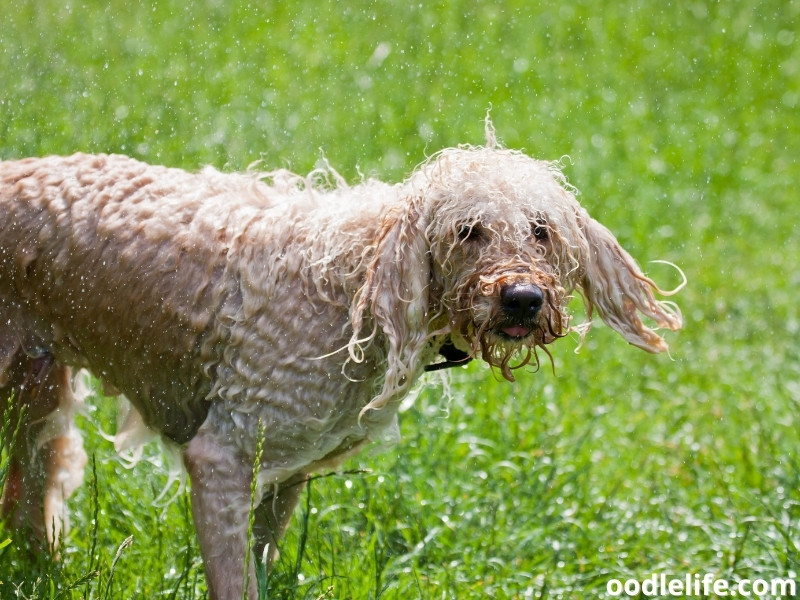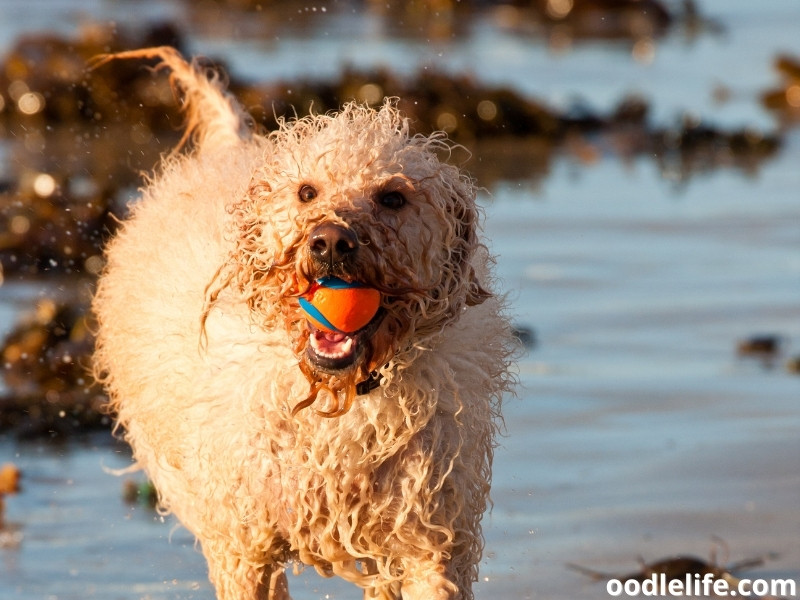Ultimate Apricot Labradoodle Guide [with Photos]
Admit it! One of the first things you consider when looking for a dog is its physical appearance. You want a breed that is adorable, cute, and one of a kind.
And the Apricot Labradoodle surely fits that description. The challenge of owning a crossbreed is there’s not much information about them. Sure, you’ll get tons of information about their purebred parents but not so many proven facts for the Labradoodle—especially an apricot-colored one.
As an expert on Doodle dogs, I get asked all the time which breed I own myself. Meet Max! My Mini Apricot Labradoodle.

If you would like to open your home to an Apricot Labradoodle or if you are a new parent to this breed, this Apricot Labradoodle guide is for you!
What is an Apricot Labradoodle?
The Apricot Labradoodle is a rare and popular dog. It is the result of breeding an Apricot Poodle and a Yellow Labrador. And it got its name from the soft and one-of-a-kind peach curly coat.
Breeding a purebred Labrador with a purebred Poodle results in different coat colors and coat patterns. The apricot-colored Labradoodle is one of the results.
These puppies are likely to change their colors as they get older, but when they are pups, you can enjoy their unique apricot color.
Other than their distinct hue, you can expect their personalities, health, appearance, and health needs to be almost the same as any other Labradoodle.

Are Apricot Labradoodles Unusual?
Yes, the apricot color is a rare color variation that makes Apricot Labradoodles extremely popular and expensive.
Apricot is the lighter version of the Red Labradoodle. Red is already a rare color, so this makes the apricot twice as unusual and special.
Scientifically, the Rufus gene causes the reddish apricot hue in the Labradoodle’s coat. This is a recessive gene, so this color only shows up rarely. The more dominant genes tend to present themselves more often.
Interestingly, Apricot Poodles share the same Rufus gene. They are one of the rarest and most exclusive canines.
Finding an Apricot Labradoodle puppy is difficult, and due to its popularity, an apricot litter from a reputable breeder is sure to get reserved and sold out immediately.
![Ultimate Apricot Labradoodle Guide [with Photos] 1](https://www.oodlelife.com/wp-content/uploads/2022/06/apricot-labradoodle-sits-on-the-bench.webp)
What are the Physical Characteristics of an Apricot Labradoodle?
Apricot Labradoodles boast different characteristics aside from their apricot coloring. Here are some of the physical factors of this breed.

Apricot Labradoodle Size
This breed falls under the small dog category. But don’t expect their body to be tiny; they have a medium build and a rather large head.
An Apricot Labradoodle’s size depends on its gender. Male adults usually reach a height of 25 inches, and female dogs grow up to 23 inches.
Factors like the height of their parents also come into play and impact the Apricot Labradoodle’s size.
Apricot Labradoodle Weight
Overall, an Apricot Labradoodle in adult form is a medium-sized dog.
They reach half of their adult weight between 4 ½ and 6 months old. They reach their maximum weight at 1 year, 5 months. Ideally, a healthy male Apricot Labradoodle may weigh up to 65 pounds while adult and healthy females reach 45 pounds.
Apricot Labradoodle Appearance

Yes, the apricot hue is a sure attention-grabber. It is a lovely and interesting color, especially on animals.
Note that Apricot Labradoodles are predominantly peach with golden streaks. The color may be called “light yellowish-orangish.”
In the puppy stage, the apricot color is more evident. However, this color coat is likely to fade as your dog matures to an almost cream-like and caramel color.
Apricot Labradoodles sport black-colored noses and bright eyes, which is the standard for the breed. They have bushy ears and thick, curly coats.
How is the Temperament of an Apricot Labradoodle?
The temperament of your Apricot Labradoodle is significantly influenced by where you got your pet from. Yes, responsible and ethical breeding practices impact your Labradoodle’s nature. Early exposure to socialization, training, and exercise at the breeder’s kennel are other factors that affect their temperament.

Meeting the parents and lineage of your Apricot Labradoodle is critical so you can form the right expectations of your puppy’s future character.
Also, remember that the parents of your Apricot Labradoodle come from two different breeds with two different temperaments. Poodles are not overtly friendly and as active as Labradors, but both share the same impressive intelligence and trainability.
Labradoodles, regardless of color, are pleasant, playful, and easygoing. They are smart like their parents and love to be involved in human activities. This breed is known for its playful personality.
These dogs love to please their humans.
Apricot Labradoodles are perfect for families with children and other pets.

What is the Life Expectancy of Apricot Labradoodles?
Apricot Labradoodles have an average life expectancy of 12 to 15 years. This is variable as several factors like overall health, genetics, nutrition, and environment can influence their life expectancy.

Breeding and Genetics
Getting your Apricot Labradoodle from a reputable breeder is important as you will have first-hand information on its parents.
Top-of-the-line breeders will make sure that they vet check, worm, and vaccinate the pups. They will also test the parents so that they are at their healthiest at the time of breeding. This will ensure the litter does not inherit any disease from their parents.
Trusted breeders will always breed ethically and not for quantity to ensure that they prioritize the health of the dogs.
Daily Nutrition

Humans live by the principle, “You are what you eat.” This same principle is applicable to your Apricot Labradoodle.
Good nutrition is not just feeding your Labradoodle enough calories. You also need to give it high-quality food. The food you give your Apricot Labradoodle should be dynamic, appetizing, and age appropriate.
It should provide them with the required energy, vitamins, and minerals.
If you have had your Apricot Labradoodle since it was a puppy, you have a greater advantage as you will know its eating habits and needs.
And don’t make the mistake of overfeeding or rewarding your dog too much because this can lead to obesity, which is not good for their health.
You should also be well aware of the human food that your Apricot Labradoodle can eat.
Environment Factors
Even if your Apricot Labradoodle is mostly indoors, it is still susceptible to pollutants and chemical toxins.
Note that like most dogs, they are closer to the ground, and they use their nose to explore their surroundings. Further, dogs use their tongues to groom themselves. This increases the possibility of them ingesting harmful chemicals.
Uncontrollable and natural elements like extreme changes in temperature also affect your pet. The heat, snow, hail storms, and heavy rains become stressors to your Labradoodle causing them to age faster.

How to Care For and Groom your Apricot Labradoodle?
Caring for your Apricot Labradoodle and grooming it is not difficult so long as you make it part of your routine.
The coat of a Labradoodle is soft, so gentle brushing is enough to control the tangles. Brushing your Labradoodle’s hair at least once a week helps reduce dander and ingrown hair.
The shedding of this breed is minimal. So you won’t have to worry about hair on your carpet, furniture, and other fabric.
It is recommended that you trim your Apricot Labradoodle’s nails once a month and have their eyes and ears cleaned. And the good news is, you can do all of these grooming activities right at home so long as you have a suitable brush and nail clippers.
Giving your Labradoodle baths is essential to keep the bad odor away. Brushing your dog’s teeth is also important to maintain good dental hygiene.

What are the Exercise Needs of an Apricot Labradoodle?
Exercise is imperative for any dog. They need to walk and be active to release some of their pent-up energy. This also serves as mental stimulation as they sniff and trace different scents when out on their walks.
The good news is, Apricot Labradoodles do not need very strenuous exercise. Regular walking activities, some running, and playtime in your backyard are enough for a Labradoodle.
But how much exercise does your Apricot Labradoodle need? Ideally, this breed needs about 45 to 60 minutes of physical activity every day. Labradoodles are not big fans of jumping and running, so walking around your neighborhood, to the dog park, or walking to do your errands with your dog in tow is enough for them.
You can challenge the physical limitations of your Labradoodle gradually with the approval of your vet.
Exercise is important is to prevent them from being obese. It also relieves their boredom and helps maintain their pleasant mood. If you have children at home, allow your Labradoodle to play with them in your backyard.
This enjoyable activity will help keep them in shape.

What are the Common Health Problems of Apricot Labradoodles?
In general, Apricot Labradoodles are healthy breeds, but like all other breeds, they are also vulnerable to certain health problems. It is best to communicate with the breeder openly to be aware of any genetic health conditions they may be prone to.
Here are some health challenges that you need to watch out for if you own an Apricot Labradoodle:
Von Willebrand’s disease
This is a hereditary disease that targets your Labradoodle’s pituitary gland. Von Willebrand is a bleeding disorder where your dog’s blood doesn’t clot properly.
While the symptoms of this disease are rather general, you have to understand that this is a lifelong condition. Unfortunately, at this time, this bleeding disorder is not curable.

Sebaceous Adenitis
Sebaceous adentitis is a skin condition that can show up in the form of common skin irritation and acne. This makes the skin of your Labradoodle prone to bruising and bleeding.
There may also be times when your Labradoodle’s stool or urine has streaks of blood. But the good news is that this disease is treatable and your dog can fully recover from it.

Skin Allergies
Many dog breeds suffer from skin allergies and the Apricot Labradoodle is no exception. Something in their diet may cause an allergy, so tweaking their food and removing specific ingredients can ease this issue.
Allergens found in your home or environment can also be the trigger, so it’s best to work with your veterinarian to tackle this health concern.
Other health issues that you need to be aware of are joint problems, hip and elbow dysplasia, epilepsy, and Addison’s disease.
Again, you have to make sure that the Labrador parent has passing elbow and hip scores while the Poodle parent has tested clear of Von Willebrand’s and sebaceous adenitis.
Since crossbreed dogs like the Apricot Labradoodle have a wider and not entirely explored gene pool compared to pure breeds, don’t be surprised if other health and hereditary conditions develop during their growth and development.

How Much Does an Apricot Labradoodle Cost?
This hybrid offspring of a Labrador Retriever and Poodle is certainly high in demand, but there are only a few reputable breeders that can supply it. This makes them pricier than other common breeds.
The cost of a Labradoodle in regular colors like cream, black, brown, or white can be between $500 and $4,000, depending on if you are looking to adopt, rescue, or buy. If you are buying one, make sure that it is from a reputable breeder and not from puppy mills or backyard breeders who are more concerned about making a profit.
If you are after the unique apricot-colored Labradoodle, expect to pay up to $6,000, and be willing to wait for a litter to be available.

Is the Apricot Labradoodle for you?
Apricot Labradoodles are cute and have very pleasant temperaments. They are an impeccable addition to any family.
But is this breed for you? Only you can answer this question. This crossbreed is one of a kind, and you will have a satisfying learning journey with your Apricot Labradoodle.
All dogs, irrespective of breed, want nothing but a good, safe, and loving home. And if you can provide that and more, the Apricot Labradoodle is perfect for you.